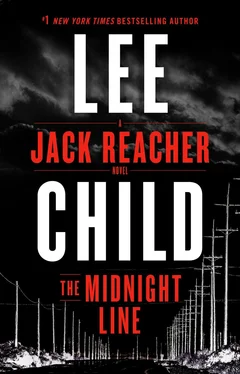“Depends.”
“On what?”
“A number of things.”
“Look on the bright side. Maybe not Miss America exactly, but assume she’s a nice-looking person.”
“This is Wyoming. They drive epic distances for a loaf of bread. For a girlfriend, two hours, maybe. A hundred miles.”
“Which doesn’t help us,” Reacher said. “That’s too big of an area to contemplate.”
Bramall nodded. “I was going to say our next move should be go talk to Porterfield’s neighbors. But I don’t know exactly what that means out here. Everyone lives twenty miles from everyone else. I bet they never see each other.”
“But I guess they depend on each other. Suppose they get a sudden emergency. Who are they going to call? The police department or the fire department two hours away? Or their nearest neighbor, who could be there in fifteen minutes? Maybe that’s the country way. Maybe country neighbors are closer than you suspect. Maybe they’re always into each other’s business and have plenty to tell us.”
“You’re very cheerful.”
Reacher didn’t answer. He was alone in the kitchen, perhaps subconsciously needing to keep his exit in view. The open window, with the broken glass and the torn-out screen. A cool breeze came in. And borne on it, sounds. Most of them were inoffensive. Wind in the trees, the beat of a heavy bird’s wing, a bee flying by, and pausing, and flying on.
One sound was different.
Very brief, and very distant. Barely audible. A fragment only. A tiny scratch, or a tiny crunch, or a tiny squelch. A small part of a familiar local sound. A Wyoming sound. Like all sounds, made from a mix of different components. Like DNA.
Grit was involved.
And rock.
And rubber.
“We need to get out,” he said. “There’s a car on the driveway.”
Bramall went first. Less likely to get stuck. Reacher followed him successfully, and Bramall put his arm back in and wound the handle to close the window. Then they hustled to the front.
Nothing yet.
“We should get in the car,” Bramall said. “Just in case.”
Reacher said, “If in doubt, run them over.”
They climbed in the Toyota and Bramall started the motor.
A truck came up over the final rise and started across the plateau.
It was a Ford pick-up truck, loaded with a police-department version of a camper shell. Its paint was clean and shiny. All white, except for the doors, which had gold stars about two feet wide and two feet high, with the county’s name in a curve above, and Sheriff’s Department in a curve below. A little like a West Point ring.
Sheriff Connelly.
—
Connelly parked close by the Toyota, at a casual angle, partly to look nonchalant and unworried and therefore unthreatening, but mostly, Reacher thought, to subtly block off the Toyota’s forward path. The guy had judged it well. Not obvious, but the Toyota would have to back up and loop around.
Connelly buzzed his window down. He was wearing his hat in the car. Plenty of room. It was a tall truck.
Reacher buzzed his window down. He was closest.
Connelly said, “You told me you had no connections to Porterfield.”
Reacher said, “I don’t.”
“Yet here you are at his house.”
“The woman I’m looking for was here, at least for a few months. I’m trying to figure out where she went next.”
“Porterfield lived alone.”
“Not always.”
Connelly said, “Have you been inside the house?”
“Yes,” Reacher said.
“How?”
“There was a previous break-in here, a year or more ago. We went in the same hole.”
“What break-in?”
“You searched this place when he died. You found what you found, and you locked up and drove away. Then someone else came by and went in the window.”
“Show me,” Connelly said.
They got out of their cars and trooped back to the far corner of the house. Connelly took a good long look. He unfolded the torn-out insect screen and held it in place, as if re-creating the original scene. He rubbed the mildew between finger and thumb, and sniffed it.
He said, “Could be a year and a half.”
Then he said, “How are things inside?”
Reacher said, “No mess, no damage, nothing pulled out or overturned. This wasn’t a burglary, or squatters.”
Connelly said, “Why do you think there was a woman living up here?”
They moved to the porch rail, facing the rear view, all lined up, looking straight ahead at trees and mountains. Bramall talked through the boots, and the comb, and the soap, and the towels, and the small pink socks.
Connelly said, “The boots don’t mean much, or the comb or the socks. They could be historic. Twenty years ago there could have been nieces and cousins here every summer and winter. That kind of stuff stays lost a long time.”
“But?” Reacher said.
“I’m prepared to admit when I make a mistake. I like the soap and the towels. Two sinks in use always means a couple, and if one soap is smelly, it’s a man and a woman. And soap and towels is real-time evidence. That’s exactly how the room looked the morning Porterfield died. I guess I missed it. But no one came forward at the time. No one ever has. All the evidence said Porterfield was a loner and no one else had barely even met him. So where was the woman then, and where is she now?”
“That’s what we’re trying to figure out.”
“If it’s the same woman.”
“Nothing says it isn’t.”
Connelly said, “The ring you showed me was pretty small.”
“Yes, it was,” Reacher said.
“Are you judging this thing by the size of the socks? Because maybe they shrunk.”
“The boots didn’t. They’re small, too.”
“Where did she serve?”
“Iraq and Afghanistan, five times.”
“A tough character.”
“Like you wouldn’t believe.”
“If it’s the same woman.”
“It might be.”
“Would such a woman come home and use smelly soap and wear pink socks?”
“I’m sure she would do exactly that. Stuff like that is the whole point of coming home.”
Connelly turned around and looked back at the house.
At the broken window.
Reacher said, “I know.”
“You know what?”
“We can’t figure out who would have done that either. It’s good clean professional work. A neat break-in, and nothing disturbed inside. Feels like training and experience were involved. Feels like government work. Except that’s ridiculous.”
Connelly said, “Mostly because what would the government want with Porterfield? Whatever he was, he was small-time. And a government agency would have called me first. As a courtesy, at least, and for practical assistance, too. Which I could have given them in this case. I had the keys.”
“Then regular petty criminals are getting neater these days.”
“That hasn’t been my experience.”
“Then who was it?”
“Fancy criminals, maybe. The kind who can afford the best.”
“What would they want with small-time Porterfield?”
Connelly didn’t answer.
Bramall said, “We apologize for trespassing. We intended no disrespect to the laws of the county.”
Connelly said, “I can’t help you with the woman. There’s no evidence of a crime. I can’t take soap and towels to a county board budget hearing. I’m sorry. I have no manpower.”
“Who could help us?” Bramall said. “Neighbors?”
“They might. I’m their sheriff, but I don’t know any of them. In fact this is only the second time I’ve ever been out here. It’s a quiet corner. The squeaky wheels get all my attention.”
“We should get going,” Bramall said. “Sheriff, thank you for your time.”
—
Читать дальше












